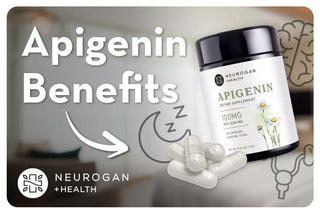Apigenin is a natural flavonoid found in plants. It's best known for being in chamomile tea, which people often drink to relax. But apigenin does more than that — it's also studied for antioxidant properties and anti-inflammatory potential which support many aspects of health [1].
In plants, flavonoids have many different functions, from UV radiation protection to defending against pathogens and regulating plant metabolism.
In humans, apigenin works through several different pathways. One of the most notable functions is its ability to bind to enzymes and receptors (GABA) that may influence relaxation, though not as direct as sedative drugs. People can get apigenin from foods or through dietary supplements to take advantage of its health benefits.
Looking at the Health Benefits of Apigenin
Apigenin is best known for supporting relaxation, but it's also been researched to support brain function, cellular health, and prostate health. That being said, apigenin isn't a drug and shouldn't be viewed as a cure or treatment for any condition.

Does Apigenin Make You Sleepy?
Apigenin isn't a sedative, but one of the most common reasons people take apigenin is for sleep.
So, how does apigenin help with sleep?
Rather than forcibly shutting off the central nervous system to make you fall asleep, apigenin has a gentler approach to the body by interacting with GABA receptors in the brain — these are like switches that help calm the mind and body by slowing down the stress response [2].
The research suggests this interaction might make it easier to unwind before bed rather than forcing sleep like a "shut down" on your computer.
Can Apigenin Make You Smarter?
We're not confident apigenin will change your IQ or help you pass finals, but some research suggests that apigenin may support brain function by optimizing neurogenesis, the process of forming new brain cells.
A study found that apigenin interacts with brain-derived neurotrophic factor (BDNF), a protein involved in learning and memory [3]. On top of this, its antioxidant potential may help protect brain cells from oxidative stress, which can contribute to cognitive decline, especially in older adults [4].
Another interesting area of research is apigenin's potential to reduce brain tissue damage and inflammation after an injury. In tests on mice with mild brain injuries, apigenin helped lower harmful molecules that can damage brain cells and increased substances that help reduce swelling and protect the brain [5].

Can Apigenin Make You Look Younger?
Apigenin supplements might help you look your best, by supporting beauty sleep and defending against oxidative stress, an interesting apigenin benefit for women.
Oxidative stress is one of the leading causes of premature aging, as free radicals damage skin cells and contribute to wrinkles and loss of elasticity. We found research in mice that suggests that apigenin may help protect skin cells from this damage by enhancing the body's natural antioxidant defenses, mainly through pathways like NRF2 [6].
Apigenin has also been studied for its potential effects on collagen production, which is important for keeping the skin firm and youthful. Researchers tested on skin cells in the lab and mice. They found that apigenin boosted two types of collagen without causing harmful side effects, suggesting that apigenin could be useful for skin health [7].
Apigenin may also support hair health by protecting follicles from oxidative stress and helping maintain normal growth cycles through its influence on TGF-beta-1.

Can Apigenin Protect Against Prostate Cancer?
Scientists have looked into how apigenin might help with prostate health, but currently, no apigenin dietary supplement is FDA-approved to mitigate or treat cancerous cells.
In lab and animal studies, they found that apigenin may support normal cell functions in the prostate and may even help control how cells grow and help remove damaged cells naturally [8].
Also, since apigenin has antioxidant properties, it may protect prostate cells from harmful molecules that can cause damage over time.
At this time, there are no clinical studies that confirm apigenin as a treatment or preventive measure for prostate cancer.
Common Uses of Apigenin in Daily Life
Apigenin supplements are often used to support relaxation, antioxidant intake, and general wellness. It's commonly found in capsules, powders, or herbal teas, with chamomile being one of the most well-known natural sources.
Safety and Recommended Intake
Apigenin is safe to eat in normal amounts from food. Dietary apigenin supplements are well tolerated, too, within the range of 50-500 mg daily. But if you're new to it, start with a small amount (25-50 mg) to see how your body reacts.
Half-Life of Apigenin
Apigenin has a half-life of around 12 hours. The half-life refers to how long it takes half of the taken substance to leave the body.
Scientists gave people a small amount of apigenin from parsley for a week and measured how much their bodies got rid of through urine [9].
Once they stopped eating parsley, the extra apigenin quickly disappeared. This shows that the body processes and clears apigenin fairly fast, with most of it gone in about 12 hours.
How Much Apigenin To Take
There's no official recommended daily intake for apigenin, as research is ongoing. However, studies on the potential effects of apigenin supplementation often range from 50 mg to 500 mg per day.

The Neurogan Health apigenin capsules contain 100 mg of pure apigenin in one small capsule. This allows you to scale your doses with oral administration as you see fit in your routine.
The Effects of Apigenin
Apigenin is most commonly used for its antioxidant support and relaxation benefits for sleep. As an antioxidant, it helps the body fight off damage from free radicals, which can contribute to premature aging and other health concerns.
Many people take apigenin to help unwind, as it interacts with GABA receptors in the brain, promoting a sense of calm without acting as a sedative that can leave you feeling groggy the next morning. Still, because of its calming effects, it's best taken in the evening, about an hour before sleep, to promote a relaxed state before bedtime.
As with any supplement, responsible use and guidance from a healthcare professional can help ensure you're getting the most out of this supplement without any unwanted side-effects.
Resources:
-
Salehi, B., Venditti, A., Sharifi-Rad, M., Kręgiel, D., Sharifi-Rad, J., Durazzo, A., ... & Martins, N. (2019). The therapeutic potential of apigenin. International journal of molecular sciences, 20(6), 1305.
-
Wasowski, C., & Marder, M. (2012). Flavonoids as GABAA receptor ligands: the whole story?. Journal of experimental pharmacology, 9-24.
-
Gao, A. X., Xia, T. C. X., Lin, L. S. Y., Dong, T. T. X., & Tsim, K. W. K. (2023). The neurotrophic activities of brain‐derived neurotrophic factor are potentiated by binding with apigenin, a common flavone in vegetables, in stimulating the receptor signaling. CNS Neuroscience & Therapeutics, 29(10), 2787-2799.'
-
Liu, R., Zhang, T., Yang, H., Lan, X., Ying, J., & Du, G. (2011). The flavonoid apigenin protects brain neurovascular coupling against amyloid-β 25-35-induced toxicity in mice. Journal of Alzheimer's Disease, 24(1), 85-100.
-
Cavalier, A., Clayton, Z., Hutton, D., McEntee, C., Seals, D., & LaRocca, T. (2021, January). THE PROTECTIVE EFFECTS OF APIGENIN ON COGNITIVE FUNCTION AND THE BRAIN TRANSCRIPTOME IN OLD MICE. In INNOVATION IN AGING (Vol. 5, pp. 682-683). GREAT CLARENDON ST, OXFORD OX2 6DP, ENGLAND: OXFORD UNIV PRESS.
-
Li, J., Mao, B., Tang, X., Zhang, Q., Zhao, J., Zhang, H., & Cui, S. (2023). Protective effects of naringenin and apigenin in ameliorating skin damage via mediating the Nrf2 and NF-κB pathways in mice. Foods, 12(11), 2120.
-
Zhang, Y., Wang, J., Cheng, X., Yi, B., Zhang, X., & Li, Q. (2015). Apigenin induces dermal collagen synthesis via smad2/3 signaling pathway. European journal of histochemistry: EJH, 59(2).
-
Fossatelli, L., Maroccia, Z., Fiorentini, C., & Bonucci, M. (2023). Resources for Human Health from the Plant Kingdom: The Potential Role of the Flavonoid Apigenin in Cancer Counteraction. International journal of molecular sciences, 25(1), 251.
-
Wang, M., Firrman, J., Liu, L., & Yam, K. (2019). A review on flavonoid apigenin: Dietary intake, ADME, antimicrobial effects, and interactions with human gut microbiota. BioMed research international, 2019(1), 7010467.




